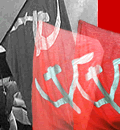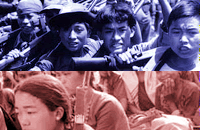| The
People's War in Nepal: Maoists' Strategy |
December
2005, Nepal Foundation for Advanced Studies (NEFAS) & Friedrich-Ebert-Stiftung
(FES)
| Nepal:
Changing Strategies of the "People's War" |
 |
Author: Dev
Raj Dahal, FES Kathmandu
 The Communist Party of Nepal-Maoist (CPN-Maoist) has been changing its
ideology and strategies with the changing dimension of national and international
politics. Initiated as a class war to establish a People's Republic in
Nepal, now it has reached an understanding with the agitating seven-party
alliance for the election of a constituent assembly to draft a new constitution
and has expressed its commitment to join competitive democratic politics
in the short run.
The Communist Party of Nepal-Maoist (CPN-Maoist) has been changing its
ideology and strategies with the changing dimension of national and international
politics. Initiated as a class war to establish a People's Republic in
Nepal, now it has reached an understanding with the agitating seven-party
alliance for the election of a constituent assembly to draft a new constitution
and has expressed its commitment to join competitive democratic politics
in the short run.
 After the Royal takeover, Nepalese politics witnessed a rapid polarization
of forces. On the one hand there is the state versus the agitating seven-party
alliance including the Maoist rebels. On the other hand, donors appear
to be polarizing themselves. India, the UK and the EU are supporting the
seven-party alliance, while China, Japan, South Korea, Russia and Pakistan
are supporting the King's efforts to hold elections and restore stability
in the country.
After the Royal takeover, Nepalese politics witnessed a rapid polarization
of forces. On the one hand there is the state versus the agitating seven-party
alliance including the Maoist rebels. On the other hand, donors appear
to be polarizing themselves. India, the UK and the EU are supporting the
seven-party alliance, while China, Japan, South Korea, Russia and Pakistan
are supporting the King's efforts to hold elections and restore stability
in the country.
 The Maoist announcement of a unilateral ceasefire, and its extension, received
mixed reactions. The Western donors, the United Nations, India and Nepalese
political parties have welcomed it. The government has not reciprocated
and has called for the surrender of arms by the rebels and announced an
amnesty if they renounce violence.
The Maoist announcement of a unilateral ceasefire, and its extension, received
mixed reactions. The Western donors, the United Nations, India and Nepalese
political parties have welcomed it. The government has not reciprocated
and has called for the surrender of arms by the rebels and announced an
amnesty if they renounce violence.
 India is consulting the USA and the UK in trying to mediate between the
political parties and the Maoists in the framework of a constitutional
monarchy and multi-party democracy.
India is consulting the USA and the UK in trying to mediate between the
political parties and the Maoists in the framework of a constitutional
monarchy and multi-party democracy.
 |
Full
story ... |
 |
 |
External
links |
December
2005
| Prachanda's
new path |
 |
With
less than two weeks to go before their ceasefire extension expires on 3
January, the Maoists say they are now training their sights on the capital.
In
briefings to select journalists taken to their heartland in Rukum earlier
this month, senior rebel commanders hinted they were following a two-track
policy of using the political process and, if that path is blocked, step
up guerrilla attacks in and around the capital to pressure the regime.
The
Maoists have been holding large meetings this month throughout the midwest
from where they launched the war 10 years ago. The aim is to explain the
decisions taken at their central committee meeting and also the deal struck
with the seven-party alliance. Their battle cry is: "To Kathmandu."
Source:
Nepali Times
June
2005
| The
People's War in Nepal: Taking the Strategic Offensive |
 |
As
we were going to press, Nepal's King Gyanendra openly took all power into
his own hands. He dissolved parliament and sent troops to place its leaders
under house arrest. He also declared the suspension of political rights
guaranteed under the 1990 constitution and unleashed "feudal fascist brutality",
as the Communist Party of Nepal (Maoist) called it, by outlawing all anti-government
protests of any kind, including criticism in the press. When students in
the city of Pokhara held a rally, the army surrounded their residence.
A BBC reporter outside heard shooting and cries as the troops stormed in.
CPN(M) Chairman Prachanda called the king's coup an attempt to "push Nepalese
society of the 21st century back to the 15th". He characterised it as "a
turning point of decisive battle between autocracy and republic" and repeated
the party's call for a "united front against the feudal aristocracy", "a
storm of united countrywide rebellion under a minimum common slogan of
a people's democratic republic and c
onstituent assembly against this last
lunacy of the feudal clique" to "overthrow the feudal autocracy to its
roots." The CPN(M) statement also said that the King's proclamation was
an act "of foreign reaction against the country and the people." Recently
the US ambassador and other representatives of the imperialist world order
have warned of the real possibility that the Maoist-led people's war could
seize countrywide political power
.
Source: BBC
|



![]() The Communist Party of Nepal-Maoist (CPN-Maoist) has been changing its
ideology and strategies with the changing dimension of national and international
politics. Initiated as a class war to establish a People's Republic in
Nepal, now it has reached an understanding with the agitating seven-party
alliance for the election of a constituent assembly to draft a new constitution
and has expressed its commitment to join competitive democratic politics
in the short run.
The Communist Party of Nepal-Maoist (CPN-Maoist) has been changing its
ideology and strategies with the changing dimension of national and international
politics. Initiated as a class war to establish a People's Republic in
Nepal, now it has reached an understanding with the agitating seven-party
alliance for the election of a constituent assembly to draft a new constitution
and has expressed its commitment to join competitive democratic politics
in the short run.
![]() After the Royal takeover, Nepalese politics witnessed a rapid polarization
of forces. On the one hand there is the state versus the agitating seven-party
alliance including the Maoist rebels. On the other hand, donors appear
to be polarizing themselves. India, the UK and the EU are supporting the
seven-party alliance, while China, Japan, South Korea, Russia and Pakistan
are supporting the King's efforts to hold elections and restore stability
in the country.
After the Royal takeover, Nepalese politics witnessed a rapid polarization
of forces. On the one hand there is the state versus the agitating seven-party
alliance including the Maoist rebels. On the other hand, donors appear
to be polarizing themselves. India, the UK and the EU are supporting the
seven-party alliance, while China, Japan, South Korea, Russia and Pakistan
are supporting the King's efforts to hold elections and restore stability
in the country.
![]() The Maoist announcement of a unilateral ceasefire, and its extension, received
mixed reactions. The Western donors, the United Nations, India and Nepalese
political parties have welcomed it. The government has not reciprocated
and has called for the surrender of arms by the rebels and announced an
amnesty if they renounce violence.
The Maoist announcement of a unilateral ceasefire, and its extension, received
mixed reactions. The Western donors, the United Nations, India and Nepalese
political parties have welcomed it. The government has not reciprocated
and has called for the surrender of arms by the rebels and announced an
amnesty if they renounce violence.
![]() India is consulting the USA and the UK in trying to mediate between the
political parties and the Maoists in the framework of a constitutional
monarchy and multi-party democracy.
India is consulting the USA and the UK in trying to mediate between the
political parties and the Maoists in the framework of a constitutional
monarchy and multi-party democracy.

